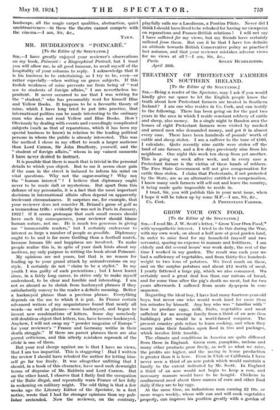MR. HUDDLESTON'S "POINCARE."
fro the Editor of the SPECTATOR.] Sra,—I have greatly enjoyed your reviewer's observations on my book, Poincare : a Biographical Portrait, but I trust
you will allow me, in all good humour, to avail myself of the hospitality of your columns to reply. I acknowledge that it is his business to be entertaining, as 1 try to be, even—or rather especially—when writing on grave subjects. If this foolish weakness of mine prevents me from being of " real use to students of foreign affairs," I am nevertheless im- penitent. It never occurred to me that I was writing for the " student," who has presumably read for himself Blue and Yellow Books. It happens to be a favourite theory of mine, which I have long tried to put into practice, that international politics can be made interesting to the ordinary man who does not read Yellow and Blue Books. How ? Obviously by dealing with events and exceedingly complicated subjects (such as that of reparations, which it has been my special business to know) in relation to the leading political persons in whom the public is already interested. This was the method I chose in my effort to reach a larger audience than Lord Curzon, Sir John Bradbury, yourself, and the " student of foreign affairs," whom in my vainest moments
I have never desired to instruct.
It is possible that there is much that is trivial in the personal details to which you object. But to me it seems clear gain if the man in the street is induced to inform his mind on vital questions. Why not the sugar-coating ? Why not the " human interest " ? I believe that diplomacy ought never to be made dull or mysterious. But apart from this defence of my personalia, it is a. fact that the most important decisions in international affairs often depend on apparently irrelevant circumstances. It surprises me, for example, that your reviewer does not consider M. Briand's game of golf as a tremendous trifle : evidently he was not in Paris in January, 1922.1 If it seems grotesque that such small causes should have such big consequences, your reviewer should blame human nature, not me. He is much too generous in giving me " innumerable readers," but I certainly endeavour to interest as large a number of people as possible. Diplomacy ought to be and is far more thrilling than a football match, because human life and happiness are involved. To make people realize this is, in spite of your dark hints about my motives, my only purpose in writing the book about Poincare.
My opinions are not yours, but that is no reason for leading up to your grand attack by animadversions on my style. I certainly do not " claim to be a stylist." In my youth I was guilty of such pretentions ; but I have learnt since, in a fairly long career, to strive only to make myself understood, to be clear and forcible and interesting. I am not so absurd as to shrink from hackneyed phrases if they satisfactorily convey to the reader a definite meaning. Better a hackneyed phrase than a precious phrase. Everything depends on the use to which it is put. In France certain advanced writers of my acquaintance found that nearly all words—as well as phrases—were hackneyed, and began to invent new combinations of letters. Some day somebody will doubtless object that letters, too, have become hackneyed. Anyhow, I will not swap my " powder magazine of Europe " for your reviewer's " France and Germany writhe in their death struggle." If there are parrot phrases there are also parrot criticisms, and this utterly mistaken reproach of the cliche is one of them.
But your real charge against me is that I have no views, that I am too impartial. This is staggering I Had I written the review I should have rebuked the author for letting him- self go far too freely. It was altogether unfitting that I should, in a book of this character, have used such downright terms of dispraise of Mr. Baldwin and Lord Curzon. But on the other hand, I observe that I flatly find the occupation of the Ruhr illegal, and repeatedly warn France of her folly in reckoning on military might. The odd thing is that a few weeks ago the Literary Editor of the Spectator, in a first notice, wrote that I had far stronger opinions than my pub- lisher pretended. Now the reviewer, on the contrary, playfully calls me a Laodicean, a Pontius Pilate. Never did I think I should have lived to be rebuked for having no viewpoint on reparations and Franco-British relations 1 I will not say I have suffered for my views, but my friends have certainly suffered from them. But can it be that I have too definite an attitude towards British Conservative policy as practised last autumn, and that your reviewer mistakes adverse views for no views at all ?—I am, Sir, &c.,






































 Previous page
Previous page